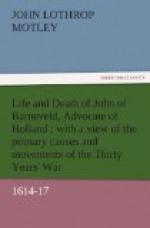“That is none of your affair,” said the King.
“Pardon me, your Majesty,” replied Caron, “they are our fellow religionists, and some one at least ought to resent the cruelty practised upon them.”
The King admitted that the destruction of the city had been an unheard— of cruelty, and then passed on to speak of the quarrel between the Duke and City of Brunswick, and other matters. The interview ended, and the Ambassador, very downhearted, went to confer with the Secretary of State Sir Ralph Winwood, and Sir Henry Wotton.
He assured these gentlemen that without fully consulting the French government these radical changes in the negotiations would never be consented to by the States. Winwood promised to confer at once with the French ambassador, admitting it to be impossible for the King to take up this matter alone. He would also talk with the Archduke’s ambassador next day noon at dinner, who was about leaving for Brussels, and “he would put something into his hand that he might take home with him.”
“When he is fairly gone,” said Caron, “it is to be hoped that the King’s head will no longer be so muddled about these things. I wish it with all my heart.”
It was a dismal prospect for the States. The one ally on whom they had a right to depend, the ex-Calvinist and royal Defender of the Faith, in this mortal combat of Protestantism with the League, was slipping out of their grasp with distracting lubricity. On the other hand, the Most Christian King, a boy of fourteen years, was still in the control of a mother heart and soul with the League—so far as she had heart or soul— was betrothed to the daughter of Spain, and saw his kingdom torn to pieces and almost literally divided among themselves by rebellious princes, who made use of the Spanish marriages as a pretext for unceasing civil war.
The Queen-Mother was at that moment at Bordeaux, and an emissary from the princes was in London. James had sent to offer his mediation between them and the Queen. He was fond of mediation. He considered it his special mission in the world to mediate. He imagined himself as looked up to by the nations as the great arbitrator of Christendom, and was wont to issue his decrees as if binding in force and infallible by nature. He had protested vigorously against the Spanish-French marriages, and declared that the princes were justified in formalizing an opposition to them, at least until affairs in France were restored to something like order. He warned the Queen against throwing the kingdom “into the combustion of war without necessity,” and declared that, if she would trust to his guidance, she might make use of him as if her affairs were his own. An indispensable condition for much assistance, however, would be that the marriages should be put off.
As James was himself pursuing a Spanish marriage for his son as the chief end and aim of his existence, there was something almost humorous in this protest to the Queen-Dowager and in his encouragement of mutiny in France in order to prevent a catastrophe there which he desired at home.




